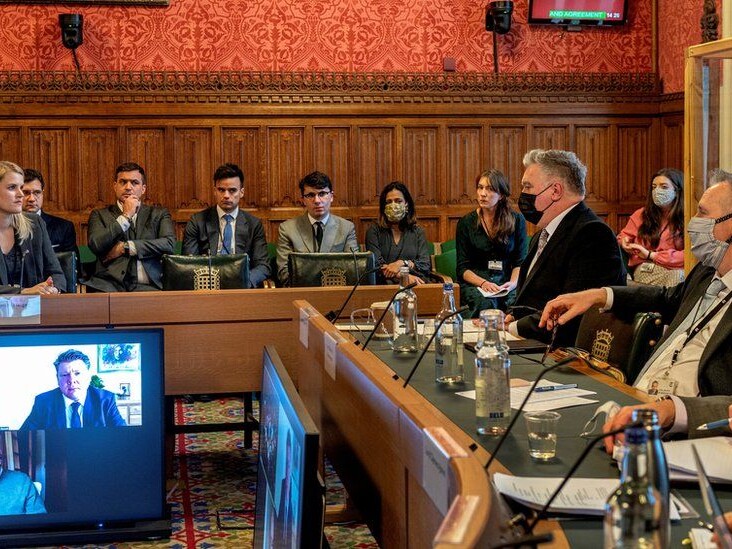The House of Lords recently debated the conclusions and recommendations of the Report from the Communications and Digital Committee AI and creative technology scaleups: less talk, more action
This is an edited version what I said in winding up the debate or the Liberal Democrats
The noble Baroness, Lady Kidron, mentioned the holistic nature of the report—the fact that it was both AI and creative tech. That is really powerful and has enabled us to have an excellent debate today. I agree that this debate should be required reading. We have covered a huge amount of ground.
The phrase “incubator economy” really has stuck. It has helped to guide us through today’s debate and made the contributions that much sharper and more relevant. We are great at hatching ideas but also at watching them fly away to mature elsewhere. We can illustrate this with a number of examples, as noble Lords have done. When ARM chose to list in New York rather than London, we lost what would now be Britain’s fifth-biggest company. When companies such as Wise follow the same path, which it recently has done, the pattern becomes clear. This was epitomised by a City AM headline on Tuesday:
“Ouch: Three tech firms bail out of the UK in a single day”.
Many noble Lords have of course mentioned Alphawave, Spectris and Oxford Ionics—at the beginning of London Tech Week too; what an appalling time to have that news. This is of long standing, in terms of DeepMind and Solexa as well. The consequences of this failure are significant: decreased global competitiveness, weaker economic prospects and a potential brain drain of talent..
The Government are putting great faith into AI adoption with the AI opportunities action plan and an industrial strategy with plans for eight growth-driving sectors, but, at the same time, we must break down a number of barriers that are holding us back. First, as we have heard from across the House, we have a significant funding gap for later-stage rounds compared to the US, which was called, very graphically, the “valley of death” by Lady Wheatcroft. As we have heard, UK pension funds manage over £3 trillion of assets yet invest barely a fraction of that in growing domestic companies.
We do have initiatives, such as the Long-term Investment for Technology and Science programme, and the British Business Bank has supported many UK unicorns. UKI2S, a public/private seed fund, has a proven track record, but the size of the funding gap remains immense. There is also a recognised lack of technology expertise among institutional investors and, probably among pension funds as well.
We are in a global technology race. Some 62% of UK AI firms identify skills shortages as a growth barrier. We are in fierce global competition for AI talent and our visa system is slow, laborious and costly. SMEs often cannot match big tech salaries and, although the scale-up visa exists, industry leaders say that it is not yet fast or cheap enough to meet the needs of rapidly growing businesses, especially in highly competitive fields like AI.
We have infrastructure issues too. As we heard from the committee, the withdrawal by this Government at the outset of £1.3 billion for AI infrastructure, including the Edinburgh supercomputer, sent exactly the wrong signal. As one witness to the committee put it, we have
“some really big gaps in infrastructure, compute and power”.
We also have the issue of regulation and procurement. Government procurement rules prevent smaller companies competing for government contracts despite government procurement being a potential driver of innovation. The committee heard that the Competition and Markets Authority is alleged to be harsh on internal roll-ups, where one British company proposes acquiring another British company.
What needs to happen now? Again, I thought the phrase “a manageable challenge” from Lord Willetts, was very useful. I also rather liked his “Hamiltonian” versus “Jeffersonian” approach. On capital, the National Wealth Fund’s £7.3 billion commitment is a start, but we need those resources deployed quickly and strategically. The Government are, it seems, taking action to unlock £75 billion through the Mansion House accord and have introduced pension fund reforms, but these will take several years to have meaningful impact.
I know that the Government listen to the Tony Blair Institute. Its recent report recommends giving the British Business Bank and the National Wealth Fund
“clear, complementary mandates to deliver on the … government’s industrial strategy”.
Specifically, it says that the British Business Bank should focus on crowding in capital for the scale-up phase—series B to C—with its maximum investment cap raised to £25 million. Meanwhile, the NWF should act as a more capital-intensive direct investor, with a minimum investment of £25 million for late-stage—series D+—strategic assets. Can the Minister comment on the progress being made in defining the roles of those two institutions? The discussion from Lord Massey, about capital gains tax in terms of AIM stocks was a very interesting suggestion.
The AI Opportunities Action Plan also stresses investment in talent. It explicitly recommends that the Government explore how best to address wider barriers, such as the cost and complexity of visas, which create obstacles for start-ups and deter overseas talent from relocating to the UK. We need a fast-track visa system for scale-ups now, not after another consultation. However, I accept the concerns of the Lord Tarassenko, that there is a falling number of UK entrants to courses.
On infrastructure, I welcome the £2 billion commitment in the spending review, and the Government’s promise to immediately double AI research capacity and launch AI growth zones for data centres. The compute strategy, promised for spring 2025, is already overdue and must deliver accessible resources to our universities, start-ups and scale-ups as soon as possible. However, I also accept the reservations of the noble Lord, Lord Tarassenko: we do not want to find ourselves investing in infrastructure when we can deliver what we need without the extent of that infrastructure, as DeepSeek demonstrated.
AI growth zones are being launched to accelerate data centre construction and infrastructure, with formal selection processes opening this spring, we understand. However, we need to tackle the environmental issues around them too. The noble Lord, Lord Hamilton—who is in his place, I notice—was absolutely right to raise that issue.
In order to scale up, start-ups need to overcome the diffusion problem, which refers to the challenge of achieving widespread adoption and market penetration for their innovations. This is impacted by a lack of access to digital platforms, which have quasi-monopoly positions. I am glad to say that Google and Apple are now under investigation by the CMA, and the outcome will be the acid test for whether the new digital markets regime results in access remedies that allow our start-ups to scale more easily.
On regulation, the Regulatory Innovation Office, under its very welcome new chair, the noble Lord, Lord Willetts, is promising, as part of its mission, to reduce red tape and help companies bring new products to market faster, but it must have teeth. Given that the AI Opportunities Action Plan aims to accelerate the adoption of safe and trustworthy AI across the economy, clarity, certainty and consistency of AI regulation for business is crucial. The Government have kicked a future AI Bill into longer, if not wholly long, grass. They talk of a sector-led, outcomes-based approach to AI regulation, but many of us have seen no detail of any proposals and believe that the minimalist approach being adopted is simply inadequate in the face of AI risks and the need for public trust. Good, outcome-based regulation is not the enemy of innovation. In fact, it can be the creator of interoperability and the driver of innovation.
We have discussed constantly, for what seems like several months, a significant issue for creatives: the use of copyright content for training AI models. I do not intend to say too much about this, but the Minister is only too well aware of the arguments being made. Given the Government’s recent failure to deliver clarity to the creative industries, the consultation on AI and copyright, the associated economic impact assessment and the technology report must provide clarity quickly, as must the working parties. Our creative industries must have the transparency they need to ensure that they can thrive alongside the tech industries without being their victim. Where is the creative industries sector plan? Everything seems to be promised for late spring—I think we have a traffic jam somewhere in Whitehall. It will identify growth barriers, we understand, and outline commitments from the Government and industry to overcome them.
I have little time left. I share the reservations about the National Data Library, but also the promise associated with it, expressed by Lord Tarassenko, and the noble Baroness, Lady Kidron. It could be a good sovereign asset vehicle, if it takes the right shape.
The committee’s report is entitled AI and Creative Technology Scaleups: Less Talk, More Action. It is not just a good title; it is an urgent instruction. Are the Government ready to match ambition with action? I very much look forward to the Minister’s reply but, as Lord Holmes, said, she has been given much to think about.






